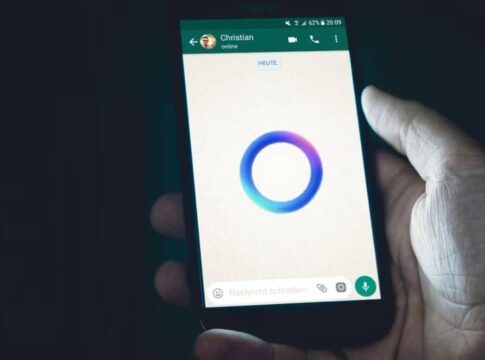WhatsApp users are seeing it for the first time these days: a blue and red ring on WhatsApp – Meta’s AI assistant. What can it do? What should you keep in mind? An overview.
WhatsApp chat with Meta AI – what should you pay attention to?
For a few days now, Facebook’s parent company Meta has been rolling out its new, in-house AI assistant in Europe. Many people are seeing a new, blue-and-red ring on WhatsApp , Facebook, Instagram, or Messenger for the first time. What can the AI do ? When will the system be available, and what should they look out for? ZDFheute answers the most important questions.
What can the blue-red ring do?
When the ring appears, Meta’s new generative AI is activated. The circle leads to a dialog window where you can communicate directly with the chatbot via text input in six different languages. The AI offers, among other things:
- Answers to everyday questions
- Real-time web research
- Suggestions for activities, recipes, gift ideas, etc.
- Creative features such as rhymes, jokes, poems
Can the function be deactivated?
The AI only becomes active when an AI chat is actively opened or the corresponding circle is tapped, so there’s no automatic integration into existing conversations or group chats. However, the feature can’t be turned off—it can only be ignored.
The world’s largest social network has around two billion users daily. Yet Facebook is repeatedly criticized.
When will the AI be available?
The rollout will take place gradually in 41 European countries. Meta is rolling out the system in waves – anyone who doesn’t yet see the circle will likely be activated in the next few days or weeks. A current version of the respective app is required.
“It’s taken longer than we would have liked to get our AI technology into the hands of people in Europe,” the company explained, citing the “complex regulatory system.” “But we’re happy to finally be here.”
Researchers in the field of artificial intelligence warned last year about the risk of losing control over it. AI systems that can operate independently, in particular, pose a major threat.
Are there any data protection risks?
The use of generative AI on platforms with billions of users raises key questions about data protection. The fact that the feature is only now being rolled out in Europe, while it was introduced in the US in September 2023, is due to the necessary adaptation to EU data protection rules .
In Europe, only a slimmed-down version of Meta AI will initially be available: WhatsApp users in the US or South American countries, for example, will be able to use the system to create images, edit photos of themselves, and talk to the AI. However, in Europe, only the text function will initially be available.
Every year, the Mobile World Congress in Barcelona is THE meeting place for the mobile phone world. And this time, the big topic is, of course, artificial intelligence. What can the new generation of mobile phones do?
Consumer advocates nevertheless warn of risks: For example, it is currently unclear whether and how the new AI functions within WhatsApp will interact with the existing end-to-end encryption – because data entered in a query to the AI is likely to be visible to Meta, even in group chats. Sensitive, personal data should therefore not be entered, data protection advocates advise.
Meta has repeatedly been criticized for its data practices. For example, the company uses user data from Facebook and Instagram to train its own AI .


